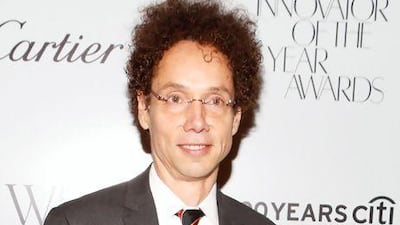Success is a big business. It is a subject studied and deconstructed to find the winning formula.
Go to any lifestyle section of your local bookstore and you will find shelves brimming with works by psychiatrists, self-help gurus and sportsmen throwing up their own ideas on how to reach the pinnacle.
Theories ranging from modelling successful people to cultivating the winning attitude have all been cited as the missing link between aspiration and achievement.
But the British-Canadian author and popular thinker Malcolm Gladwell is having none of that.
His 2008 best-selling work Outliers: The Story of Success was partly a denunciation of such ideas, rendering some of them superficial at best.
He argues the seeds of achievement are not totally under your control.
“Your background definitely has an impact,” he says. “When we look at our own reasons for success we think the principles are true for everyone. We tend to generalise our experience and Outliers has different stories showing that culture and your generation can also play a huge role.”
It is this message that Gladwell will deliver to some of the region’s most powerful executives as part of the du CEO forum; an invitation-only event to be held tomorrow in Dubai.
Gladwell will invite the suits to reflect and identify the opportunities seized to reach their success.
“That is important because that is a trap that anyone who is successful can fall into,” he says. “One of the things that we do as human beings is rewrite our own history and we write ourselves into it and others out of it. So it will be fascinating to speak to such an established and successful group to see their reactions.”
Gladwell denies the message could be received as an unwanted hard truth.
A regular on the leadership circuit, he says executives welcome the chance to step back and survey their achievements.
He points to the Microsoft founder Bill Gates as an example, a success story prominently featured in Outliers.
“He is one of the richest men in the world and he was the one who made the argument that he was a product of his lucky breaks and environment,” he says.
“I don’t think it is unusual for successful people to appreciate the complexity of their life story.”
Outliers was triggered by Gladwell’s own family history.
Born in England to a Jamaican-born psychotherapist and a British father who is a maths professor, the 49-year-old grew up in a privileged environment where education was championed.
Gladwell’s childhood years spent with his father at universities inspired a love of books which, in turn, led him to journalism.
After a few years working with current affairs magazines such as The American Spectator, Gladwell’s career flourished after being poached by The Washington Post in 1987 to cover science and business.
His critically acclaimed essays for The New Yorker, having moved to the reputable publication in 1996, laid the groundwork for his influential 2000 debut The Tipping Point, an entertaining treatise on social epidemics.
Gladwell argues his present success could have only come on the back of a decade of hard work and practice, a process dubbed in Outliers as The 10,000 Hour Rule.
The book points to The Beatles and Gates as examples of mastery achieved after the appointed time: the legendary group took off after an accumulated 10,000 hours of performances between 1960 to 1964 while Gates spent the same amount of hours computer programming, beginning from 1968 at the age of 13.
That said, Gladwell is glad for reaching that realisation after the fact.
“The 10,000 hours did come to me recently and it made sense to me as I reflected back upon my career,” he says.
“But I don’t know if I would have been receptive to it if I came across it earlier. In your early 20s you can fool yourself into believing that you are as good as you need to be and not that it could take 10 years to master.”
Gladwell recalls his 10,000 hours stint included seizing the opportunities coming his way.
He hopes all UAE leaders, from chief executives of mega-corporations to small business owners, provide employees similar avenues for success. “That is really the point that I want to drive home,” Gladwell says. “Success is created collectively. If you are doing something for 10 years, then someone has to help you. Someone has to make it possible for you to devote that time and attention.”
? the books
As well as Outliers, Malcolm Gladwell's books have established him as one of the world's premier thinkers
Tipping Point (2000)
• The title is defined as "the moment of critical mass, the threshold, the boiling point". Gladwell looks at the causes behind social phenomena from fads to crime rates.
Blink (2005)
• Gladwell looks at the process of spontaneous decisions and points to examples from the science and marketing worlds, as well as pop culture.
What the Dog Saw (2009)
• A compilation of Gladwell's articles from The New Yorker. The book is divided into three parts: Obsessives, Pioneers and Other Varieties of Minor Genius.
For details, go to www.gladwell.com
Follow us on Facebook for discussions, entertainment, reviews, wellness and news.
Follow us


